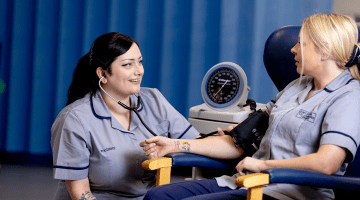About this course
Gain advanced knowledge in a number of cardiac diseases, their underlying pathophysiology, aetiology, management and care.
- Explore cardiovascular health and management of specific disease groups focussing on the holistic, spiritual and psychological care of patients.
- Study on a course taught by research-active, clinically relevant healthcare professionals who are experts in their field.
- Gain practical experience and an understanding of different disease groups and how they are managed in a variety of clinical settings.
- Acquire skills, knowledge and practical experience in our clinical practice simulation labs.
- Enjoy a range of teaching pedagogies from face-to-face lectures, workshops, sim abs, clinical placements and group tutorials.
The landscape of cardiology is fast moving and is at the forefront of science when it comes to evidence base research and innovation. Therefore, an in‐depth knowledge of the pathological processes, cardiovascular physiology and pharmacology are required for those wishing to progress in this rapidly evolving speciality.
The aim of this PgCert Cardiovascular Health and Management is to equip you with the in-depth knowledge and skill to be able to confidently plan and deliver safe and quality care to patients. There are currently a suite of modules you can choose from which compliment and make up your PgCert. These are as follows:
70804NAPPG Heart Failure - Interdisciplinary Approach to Management and Care
7000ACHD Adult Congenital Heart Disease: Care of the patient through their life span
7015NAPPG Developing Practice in Cardiac Care
7002CMA Cardiac Care - Adult
Each of these modules is worth 20 credits at Level 7. To be awarded the PgCert you will be required to successfully complete three modules.
You will have the opportunity to develop some key transferable skills. These will include presentation skills, critical thinking, academic writing, problem solving, communication, teamwork and leadership. These transferable skills will provide you with a strong foundation when it comes to pursuing career development opportunities in the future.
You will be based in our Faculty of Health Building on Tithebarn Street where we have the state of the art clinical practice simulation suites, access to library facilities, academic librarians, digital skills team, computers and loan laptops, and study support.
Course modules
Discover the building blocks of your programme
70804NAPPG - Heart Failure - An Interdisciplinary approach to management and Care - runs over 15 weeks with a September intake.
7000ACHD - Adult Congenital Heart Disease - delivered over a week with a November intake
7015NAPPG - Developing Practice in Cardiac Care - runs over 15 weeks with a January intake.
7002CCMA - Cardiac Care - Adult - runs over 15 weeks with a January intake.
Further guidance on modules
Modules are designated core or optional in accordance with professional body requirements, as applicable, and LJMU’s Academic Framework Regulations. Whilst you are required to study core modules, optional modules provide you with an element of choice. Their availability may vary and will be subject to meeting minimum student numbers.
Where changes to modules are necessary these will be communicated as appropriate.
Core modules
Adult Congenital Heart Disease: Care of the patient through their lifespan
20 credits
20 credits
This module focuses on developing a critical understanding of congenital heart disease in adults, including its origins, presentation, and impact, and addresses specific care requirements. Topics covered include cardiovascular anatomy, pathophysiology, management, long-term effects, healthcare implications, patient perspectives, and ethical issues.
Heart Failure-Interdisciplinary Approach to Management and Care
20 credits
20 credits
The structure of the module is designed to enhance the students understanding and knowledge of heart failure both from a healthcare professional, patient and carer perspective .
The programme runs over 15 weeks and is a combination of face to face and online learning. The face-to-face learning is delivers through a variety or means, via lectures, seminars, workshops, group work and includes up to 4 hours within the simulated learning environment. Teaching and learning will be supported by subject experts from cardiology and cardiothoracic backgrounds. Tutorial support will be provided by the module lead and will support the student to select and develop the case study towards their assessment.
Students on the programme are strongly encouraged to seek out and arrange their own negotiated opportunities for learning within a cardiac clinical setting. They can further enhance this with the use of a reflective journal which formatively compliments their application of learning.
Optional Modules
Developing Practice in Cardiac Care
20 credits
20 credits
This module will help you to develop your knowledge and skills so that you are able to provide high quality care that is based on sound clinical judgement and robust evidence. It will cover areas including:
- The evolution of cardiovascular care and the role of evidence
- Advanced anatomy and physiology of the heart and circulation
- Physical assessment of the cardiac patient
- Haemodynamic assessment and intervention
- Single and 12 lead ECG interpretation
- Introduction to biochemistry and haematology
- Cardiac pharmacology and patient concordance
- Care of the patient post cardiac intervention
- Managing patients with complex heart failure in the acute setting
- Advanced life support
- Promoting healthy behaviour change through cardiac rehabilitation and secondary prevention
- Supporting patients from Black, Asian and Minority Ethnic backgrounds to navigate the healthcare systems
- Caring for patients who are nearing the end of life and supporting grieving families
Cardiac Care – Adult
20 credits
20 credits
This module will help you to develop your knowledge and skills so that you are able to provide high quality care that is based on sound clinical judgement and robust evidence. It will cover areas including:
- The evolution of cardiovascular care and the role of evidence
- Advanced anatomy and physiology of the heart and circulation
- Physical assessment of the cardiac patient
- Haemodynamic assessment and intervention
- Single and 12 lead ECG interpretation
- Introduction to biochemistry and haematology
- Cardiac pharmacology and patient concordance
- Care of the patient post cardiac intervention
- Managing patients with complex heart failure in the acute setting
- Advanced life support
- Promoting healthy behaviour change through cardiac rehabilitation and secondary prevention
- Supporting patients from Black, Asian and Minority Ethnic backgrounds to navigate the healthcare systems
- Caring for patients who are nearing the end of life and supporting grieving families
Your Learning Experience
An insight into teaching on your course
We adopt an active blended learning approach, meaning you will experience a combination of face-to-face and online learning during your time at LJMU. This enables you to experience a rich and diverse learning experience and engage fully with your studies. Our approach ensures that you can easily access support from the academic team either by meeting on-campus or via a video call to suit your needs.
Teaching is delivered through a combination of lectures, workshops, seminars and practical activities in our simulation suites. You will be required to engage with our on line activities and discussions using our virtual learning environment, Canvas.
The teaching contact time on a part-time module is four hours per week. On the ACHD module, which is delivered over one week, contact teaching time will be seven hours per day.
How learning is monitored on your programme
To cater for the wide-ranging content of our courses and the varied learning preferences of our students, we offer a range of assessment methods on each programme.
Your progress on the PgCert will be assessed by a multiple choice exam with a pass rate of 80%, and a written case study report with a pass threshold of 50%.
Where you will study
The PgCert will be delivered in the Faculty of Health Building, which is part of the city centre campus, situated on Tithebarn Street. The location has access to parking and is only a 10-minute walk away from Liverpool Lime Street station. There is easy access to bus routes in and out of the city. The campus provides a café, library facilities, a quiet area for study and access to digital skills and IT support. The building is accessible from the main street and there is access to each floor by passenger lifts. The university is committed to making sure that the environment is accessible to all students who have a disability.
Course tutors

Dr Karen Higginbotham
Programme Lead
Karen is an experienced academic and registered general nurse who has a clinical background in critical care nursing. Karen's research interests focus on patients diagnosed with heart failure; more specifically those diagnosed with advance heart failure who require palliative care. She is currently a PI on a project which involves investigating the efficacy of ACP in patients with advance heart failure. Karen is a governor at Liverpool Heart and Chest, treasurer of BANCC and belongs to the PALCARE North West Steering Group. Karen is Director of Studies for a number of LJMU PhD students. Publications include a grounded theory study exploring the vicious cycle of heart failure care and collaborating on a Nursing Framework for HFSN which was endorsed by the British Society of Heart Failure.
-
 Advanced Practice Senior Lecturer Full time
Advanced Practice Senior Lecturer Full time
Career paths
Further your career prospects
LJMU has an excellent employability record with 96% (HESA 2018) of our postgraduates in work or further study six months after graduation. Our applied learning techniques and strong industry connections ensure our students are fully prepared for the workplace on graduation and understand how to apply their knowledge in a real world context.
A number of our post graduates go onto more senior leadership, teaching and management roles after graduating. Many come back and apply for PhD scholarships wanting to focus on a research pathway.
Tuition fees and funding
- Part-time per credit:
- £50
The University reserves the right to increase tuition fees in accordance with any changes to the maximum allowable fees set by the UK Parliament. In the event of such a change, any fee increase will be subject to a maximum cap of 10% of the total course cost as originally stated at the time of your offer.
Fees
The fees quoted at the top of this page cover registration, tuition, supervision, assessment and examinations as well as:
- library membership with access to printed, multimedia and digital resources
- access to programme-appropriate software
- library and student IT support
- free on-campus wifi via eduroam
Additional costs
Although not all of the following are compulsory/relevant, you should keep in mind the costs of:
- accommodation and living expenditure
- books (should you wish to have your own copies)
- printing, photocopying and stationery
- PC/laptop (should you prefer to purchase your own for independent study and online learning activities)
- mobile phone/tablet (to access online services)
- field trips (travel and activity costs)
- placements (travel expenses and living costs)
- student visas (international students only)
- study abroad opportunities (travel costs, accommodation, visas and immunisations)
- academic conferences (travel costs)
- professional-body membership
- graduation (gown hire etc)
Funding
There are many ways to fund postgraduate study for home and international students. From loans to International Scholarships and subject-specific funding, you’ll find all of the information you need on our specialist postgraduate funding pages.
Please be aware that the UK’s departure from the EU may affect your tuition fees. Learn more about your fee status and which tuition fees are relevant to you.
Fees
The fees quoted above cover registration, tuition, supervision, assessment and examinations as well as:
- Library membership with access to printed, multimedia and digital resources
- Access to programme-appropriate software
- Library and student IT support
- Free on-campus wifi via eduroam
Additional costs
Although not all of the following are compulsory/relevant, you should keep in mind the costs of:
- books (should you wish to have your own copies)
- printing, photocopying and stationery
- PC/laptop (should you prefer to purchase your own for independent study and online learning activities)
- mobile phone/tablet (to access online services)
- placements (travel expenses)
- student visas (international students only)
- professional-body membership
- graduation (gown hire etc)
There are many ways to fund study for home and international students. From loans to International Scholarships and subject-specific funding, you’ll find all of the information you need on our specialist funding pages.
Entry requirements
You will need:
Qualification requirements
Undergraduate degree
BA/BSc (Hons) in relevant field at 2:2 or above, or evidence of potential to study at Masters Level
Please Note: All international qualifications are subject to a qualification equivalency check.
How to apply
Securing your place at LJMU
To apply for this programme, you are required to complete an LJMU online application form. You will need to provide details of previous qualifications and a personal statement outlining why you wish to study this programme.
Your university life
From accommodation and academic support to clubs and societies. Find out what LJMU has to offer.
Related Links
Talk to our students
Connect with a current LJMU student for advice and guidance on university life, courses and more.
See what our students are saying
At LJMU we want you to know you’re making the right choice by studying with us. You can see what our students are saying about their experience with us through their reviews on the following websites:
Related Links
News and views
Browse through the latest news and stories from the university
The University reserves the right to withdraw or make alterations to a course and facilities if necessary; this may be because such changes are deemed to be beneficial to students, are minor in nature and unlikely to impact negatively upon students or become necessary due to circumstances beyond the control of the University. Where this does happen, the University operates a policy of consultation, advice and support to all enrolled students affected by the proposed change to their course or module.

















